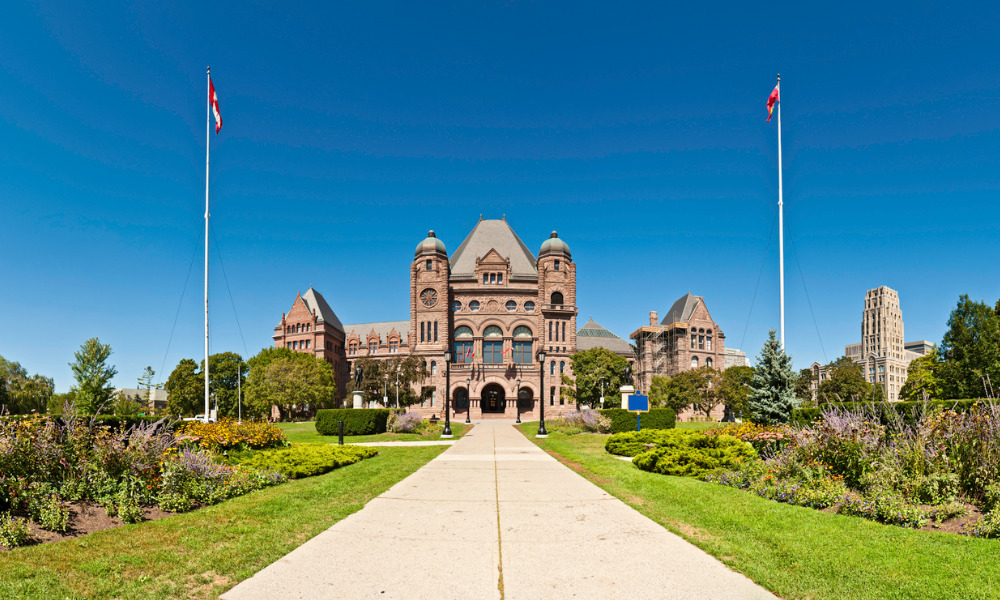
Questioners focus on class action certification tests, as well as legal aid clinics and clients

Proposed changes to class actions, Crown immunity and legal aid — part of an omnibus justice bill put forth by Attorney General Doug Downey last year — came to the fore during the first of several days of hearings at the Standing Committee on Justice Policy.
The bill, which will also be discussed on Thursday and Friday via public webcast, has been debated in the legal community over the past six months. Many of the changes have been long-anticipated, or even lauded for modernizing the system, but others have stoked opposition, as Law Times has previously reported. Mandatory and conjunctive “superiority” and “predominance” tests at the certification stage of class actions and administrative forfeiture have both elicited concerned from lawyers, as have impacts on legal aid clinics and legal aid lawyers and their clients.
On Wednesday, the agenda included Law Society of Ontario Treasurer Malcolm Mercer, Ontario Bar Association president Colin Stevenson, and Association of Community Legal Clinics of Ontario Executive Director Lenny Abramowicz. Other speakers over the next few days include representatives of the major accounting firms, the Law Commission of Ontario, as well as lawyers from legal clinics and private firms.
In prepared remarks for the committee, Stevenson noted that the proposed class action changes were contentious and could create “a category of cases at risk of never being litigated,” “namely those involving socially important issues that are likely not amenable to alternative forms of litigation and that involve significant individual issues.” Melanie Webb, chair of the OBA’s criminal justice section, also asked for additional funding for Legal Aid Ontario related to Rowbotham Orders, as well as “an amendment to remove the ability under the proposed Act for LAO to immediately impose negative financial consequences on a lawyer, who is providing legal aid services, without an obligation for LAO to advise the lawyer of the basis of the concern.”
“We recognize the existing reporting obligations lawyers have to ensure the integrity of the legal aid system. We aren’t seeking to change that at all,” said the OBA’s written remarks.
“However, the provision as drafted is contrary to principles of fairness and due process. It places an unfair burden on lawyers who are providing legal services to Ontario’s most vulnerable citizens and could ultimately lead to fewer lawyers being willing to take on legal aid services.”
Avvy Go, director of the Metro Toronto Chinese & Southeast Asian Legal Clinic, asked that law makers strengthen the role of legal clinics in the bill, “so that community legal clinics – and not Legal Aid Ontario - will determine what services should be provided by the clinics.”
In her remarks, Go noted the disproportionate access to justice issues facing racialized communities, particularly as the COVID-19 pandemic sparked Anti-Asian incidents.
“We are opposed to changing the [Legal Aid Services Act] to give LAO the power to decide what services legal clinics should provide. As it now stands, the LAO board and senior management do not reflect the Chinese and Southeast Asian communities, nor do they have any connection to our communities,” said her prepared remarks. “Allowing LAO to become the centralized body to determine the legal needs for all communities in Ontario, would mean, in the case of the Chinese and Southeast Asian communities, that the people who decide what services our communities get will have no connection to the very communities that require these services.”
Indeed, the South Asian Legal Clinic of Ontario suggested in a written submission to the committee that the bill be amended “to ensure that the composition of the board be reflective of the diverse communities that are served by Legal Aid Ontario including the large populations of racialized and Indigenous communities.”
“As we speak, people around the world and in Ontario are reflecting on issues of systemic racism and diversity and inclusion,” said SALCO’s submissions, which were presented at the committee hearing by executive director Shalini Konanur.
Cara Zwibel, who spoke on behalf of the Canadian Civil Liberties Association, said the bill’s attempt to restructure Ontario’s legal aid raised more questions than answers.
“Is the purpose that the legal aid system will do more with less? Is the government prepared to acknowledge that legal aid is likely to do less in light of the changes since while some services must currently be covered by legal aid, the new statute would make all but a handful of services discretionary? The government’s communications around the need to reorganize legal aid has not been clear and I believe the public deserves answers,” said her prepared remarks.